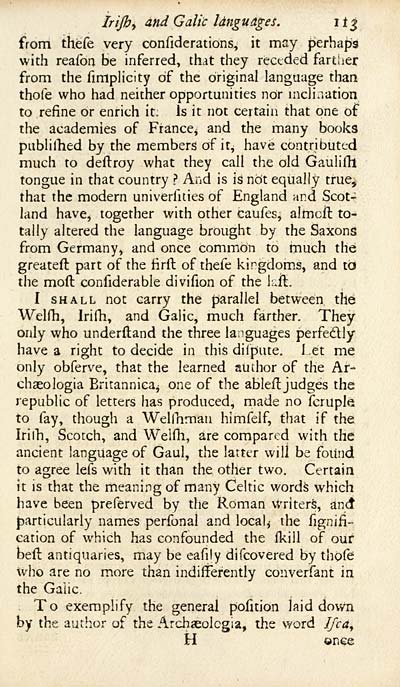Blair Collection > Critical dissertations on the origin, antiquities, language, government, manners, and religion, of the antient Caledonians, their posterity the Picts, and the British and Irish Scots
(151)
Download files
Complete book:
Individual page:
Thumbnail gallery: Grid view | List view

irijh^ and Galic Idnguages. it^
from thefe very confiderations, it may perhaf>9
with reafoa Be inferred, that they receded farther
from the fimplicity of the original language than
thofe who had neither opportunities nor mcli.iation
to refine or enrich it. Is it not certain that one of
the academies of France^ and the many books
pabhlhed by the members of it, have contributed
much to deftroy what they call the old Gaulirtl
tongue in that country ? And is is not equally true,
that the modern univerfities of England and Scot-
land have, together with other caufes, almcft to-
tally altered the language brought by the Saxons
from Germany, and once common to much the
greateft part of the firft of thefe kirgdom.s, and to
the moft confiderable divifion of the kll.
I SHALL not carry the parallel between the
Welfh, Irifh, and Galic, much farther. They
only who underftand the three languages perfedly
have a right to decide in this diipute. 1 .et me
only obferve, that the learned author of the Ar-
chaeologia Eritannicaj one of the ableft judges the
republic of letters has produced, made no fcruple
to fay, though a Wellhman himfelf, that if the
IrilTi, Scotch, and Welfli, are compared with the
ancient language of Gaul, the latter will be foiind
to agree lefs with it than the other two. Certain
it is that the meaning of many Celtic words which
have been preferved by the Roman Writers, and
|)articularly names perfonal and localj the fignifi-
eation of which has confounded the fkill of our
beft antiquaries, may be eafily difcovered by thofe
who are no more than indifferently converfant in
the Gaiic,
To exemplify the general pofition laid down
by the author of the Archaeolcgia, the v/ord Ifca,
H onee
from thefe very confiderations, it may perhaf>9
with reafoa Be inferred, that they receded farther
from the fimplicity of the original language than
thofe who had neither opportunities nor mcli.iation
to refine or enrich it. Is it not certain that one of
the academies of France^ and the many books
pabhlhed by the members of it, have contributed
much to deftroy what they call the old Gaulirtl
tongue in that country ? And is is not equally true,
that the modern univerfities of England and Scot-
land have, together with other caufes, almcft to-
tally altered the language brought by the Saxons
from Germany, and once common to much the
greateft part of the firft of thefe kirgdom.s, and to
the moft confiderable divifion of the kll.
I SHALL not carry the parallel between the
Welfh, Irifh, and Galic, much farther. They
only who underftand the three languages perfedly
have a right to decide in this diipute. 1 .et me
only obferve, that the learned author of the Ar-
chaeologia Eritannicaj one of the ableft judges the
republic of letters has produced, made no fcruple
to fay, though a Wellhman himfelf, that if the
IrilTi, Scotch, and Welfli, are compared with the
ancient language of Gaul, the latter will be foiind
to agree lefs with it than the other two. Certain
it is that the meaning of many Celtic words which
have been preferved by the Roman Writers, and
|)articularly names perfonal and localj the fignifi-
eation of which has confounded the fkill of our
beft antiquaries, may be eafily difcovered by thofe
who are no more than indifferently converfant in
the Gaiic,
To exemplify the general pofition laid down
by the author of the Archaeolcgia, the v/ord Ifca,
H onee
Set display mode to: Large image | Transcription
Images and transcriptions on this page, including medium image downloads, may be used under the Creative Commons Attribution 4.0 International Licence unless otherwise stated. ![]()
| Permanent URL | https://digital.nls.uk/76288272 |
|---|
| Description | A selection of books from a collection of more than 500 titles, mostly on religious and literary topics. Also includes some material dealing with other Celtic languages and societies. Collection created towards the end of the 19th century by Lady Evelyn Stewart Murray. |
|---|
| Description | Selected items from five 'Special and Named Printed Collections'. Includes books in Gaelic and other Celtic languages, works about the Gaels, their languages, literature, culture and history. |
|---|

